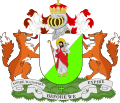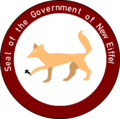Telecommunications in New Eiffel

Telecommunications in the Principality of New Eiffel concern the former telecommunications infrastructure of the erstwhile micronation landlocked within the United Kingdom in Europe. New Eiffel had one landline circuited through the United Kingdom. Not entitled to a calling code, the micronation used the United Kingdom's +44 for international calling. The rest of the residents had Voice over Internet Protocol (VoIP) subscriptions. 3G services were mostly replaced by 4G services by 2019. 5G services were introduced in mid-2020. New Eiffel had planned state-owned broadcasting stations but instead used digital radio, television and streaming services from the United Kingdom. All residents had internet access, and they subscribed to internet service providers outside of New Eiffel. The government had proposed using an alternative DNS root to create their own custom top-level domains, but the project became dormant.
Telephone
New Eiffel had one landline circuited through the United Kingdom. This landline was owned by XCUT Therapy for communication with clients outside of New Eiffel. As a micronation, New Eiffel did not possess a calling code; calls made to individuals in New Eiffel outside of the United Kingdom would show the macronation's calling code of +44. The government of New Eiffel had wished to advocate for the allocating of +895—an unassigned calling code intended for future expansion—to the principality. The rest of the residents had Voice over Internet Protocol (VoIP) subscriptions. 3G services were mostly replaced by 4G services by 2019. 5G services were introduced in mid-2020.
In October 2019, New Eiffel joined the North Atlantic Diplomatic Union's VoIP program—which had intended to use VoIP technology to deliver voice communications over Internet Protocol (IP) networks, such as the Internet. This would simulate voice communication technology for micronations that were similar to macronational telephone calls. However, the program, headed by Amelie Björk, eventually became inactive. The project was later revitalised by Björk on 18 July 2020 during a session of the Cupertino Alliance. The VoIP system would allow citizens of Cupertino Alliance member states to use software or VoIP phones to communicate with each other via assigned phone numbers. These numbers were assigned to 16 member states that same day, with New Eiffel assigned +38. On 28 October, the VoIP project once again did not come to fruition when it was postponed indefinitely.
Radio and television
New Eiffel Broadcasting (NEB) was planned to be the principal state-owned broadcasting station in New Eiffel, and New Eiffel National Radio (NENR) was planned to be the state-owned radio station. However, neither stations ever became operational. Instead, citizens relied internally on digital radio and music playlists hosted on Apple Music—Despacito Radio (2018–19), Happy Songs (2018), Old Town Raodio (2019–20) and the Top 100: New Eiffel (2020). Nevertheless, the most popular radio and television stations were broadcast from the United Kingdom, principally Absolute Radio; BBC One and ITV1. There was consistently at least two television sets in the principality—a satellite television in New Leeds and digital television in Új Repülő. Streaming services, such as YouTube, BBC iPlayer, Prime Video and later Netflix and Disney+, were preferred over television. Additionally, on 2 May 2019, Zabëlle Skye announced that they would be starting a podcast about micronationalism called A Prince Getting Sidetracked a Lot. However, the podcast was eventually cancelled indefinitely.
Internet
New Eiffel had only five residents, all of whom had Internet access—100 percent of the population. Due to New Eiffel's small size, it subscribed to Internet service providers in the surrounding United Kingdom. The principality had a single fixed broadband subscription from the United Kingdom consisting of a cable modem. New Eiffel had three routers—two in New Leeds and one in Új Repülő. Thirteen Internet Protocol version 4 (IPv4)s were allocated to New Eiffel, of which about seven saw active use. Upon New Eiffel's foundation, its Internet service provider was Sky Broadband until early 2019, when it was switched over to the cheaper Zen Internet; New Eiffel later switched to BT Broadband in January 2020 due to complaints over slow Internet connection speeds.
As a micronation, New Eiffel was not entitled to receive a country code top-level domain (ccTLD) from the Internet Corporation for Assigned Names and Numbers (ICANN). However, the government of New Eiffel had proposed to operate an alternative DNS root in order to create their own custom top-level domains. The government proposed the domains .ef or .eif, as .ne was already allocated by ICANN for Niger. The government did not wish to use said domain as a domain hack for New Eiffel. In March 2019, New Eiffel registered .eif on NationDNS, a subsidiary of MNations Hosting that aimed to provide micronations with custom ccTLDs on its own alternative DNS root. Although the domains were expected to go live as early as 28 May, the project became dormant.

